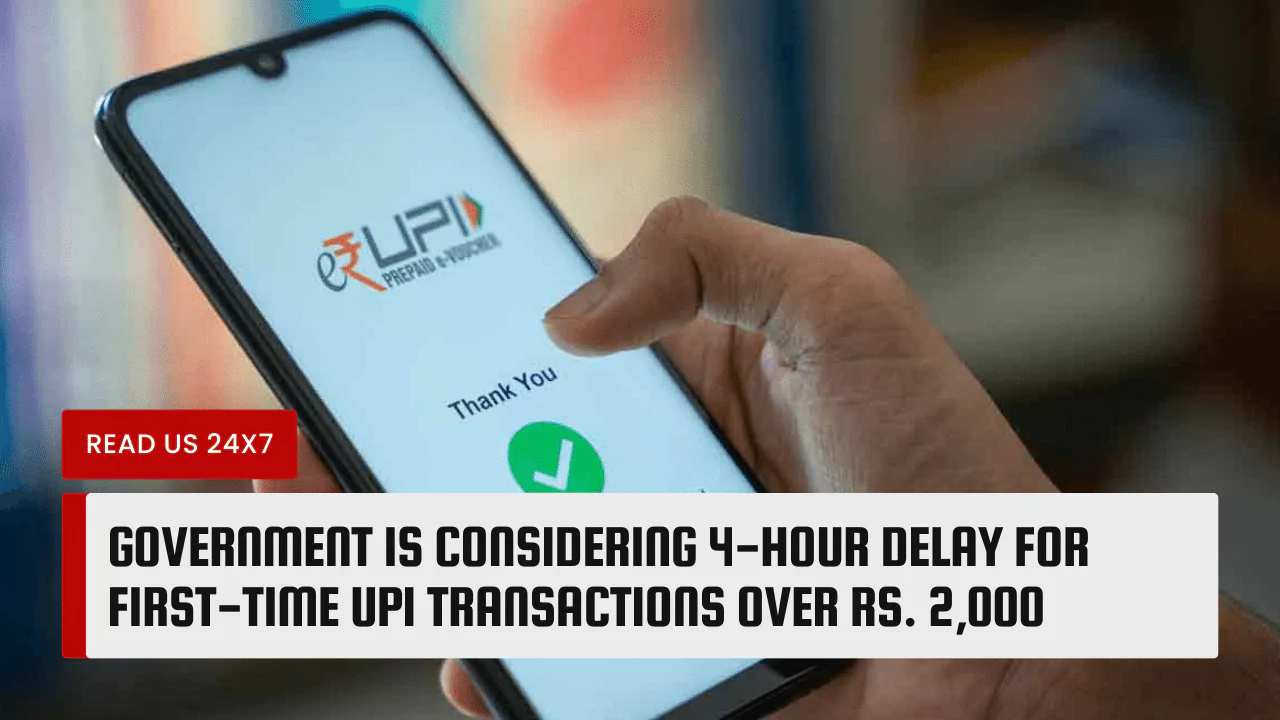The Indian government is reportedly planning to introduce a minimum time limit for the first transaction between two users of digital payment platforms, especially for amounts exceeding Rs 2,000. This is a proposed measure to combat the rising cases of online payment fraud in the country. The article will explain the details of the proposed delay in UPI transactions, the impact on users, and the possible alternatives to delaying transactions.
Details of the Proposed Delay in UPI Transactions
According to a report by The Indian Express, the government is looking to add a time limit of four hours for first-time digital transactions over Rs 2,000. This means that a four-hour time limit would apply whenever a user initiates the first payment of over Rs 2,000 to another user with whom they have never transacted before.
On Tuesday, representatives from the Reserve Bank of India, as well as other public and private sector institutions, and tech companies such as Razorpay and Google, will gather for a meeting to continue discussing the matter.
The proposed plan is not confined to delaying or restricting the first transaction upon account creation, a practice already in place across various digital payment channels. For instance, when a user establishes a new UPI account, they can transfer a maximum of Rs 5,000 within the initial 24 hours. Similarly, in the case of National Electronic Funds Transfer (NEFT), following the activation of a beneficiary, up to Rs 50,000 (in full or in parts) can be transferred during the first 24 hours. Rather, the plan aims to regulate every initial transaction between two users, irrespective of their individual transaction history.
The main objective of the plan is to address cybersecurity concerns and prevent fraud in online transactions. A senior government official, speaking on condition of anonymity, stated, “We are looking to add a time limit of four hours for first-time digital transactions over Rs 2,000. The discussion will be taken up during a meeting on Tuesday with government and industry stakeholders, including the Reserve Bank of India, various public and private sector banks, and tech companies like Google and Razorpay.” Explaining the mechanism, the official added, “Basically, how it will work is that you will have four hours after making a payment to someone for the first time to reverse or modify the payment.”
Impact on Users
The proposed delay in UPI transactions may have both positive and negative impacts on users. On the positive side, the delay may provide users with a higher level of security and protection from fraud. Users may have more time to verify the authenticity and legitimacy of the recipient and the transaction. Users may also have the option to cancel or modify the transaction within the four-hour window if they find any discrepancy or error.
On the negative side, the delay may cause some inconvenience and frustration for users who need to make urgent or time-sensitive payments. Users may have to wait for four hours to complete the transaction and receive the confirmation. Users may also face difficulties in accessing certain services or products that require immediate payment. For example, users may not be able to book a cab, order food, or purchase tickets online using UPI if the transaction is delayed by four hours.
Alternatives to Delaying Transactions
While the proposed delay in UPI transactions may have some benefits, it may also have some drawbacks. Therefore, some users may prefer other alternatives to delaying transactions. Some of the possible alternatives are:
- Education on UPI fraud: Users may be educated on how to identify and avoid UPI fraud. Users may be informed about the common types and methods of UPI fraud, such as phishing, spoofing, vishing, and malware. Users may be advised to check the details of the recipient, the amount, and the purpose of the transaction before confirming it. Users may also be encouraged to report any suspicious or fraudulent activity to the authorities and the service providers.
- Enhanced security features: Users may be provided with enhanced security features to safeguard their UPI transactions. Users may be required to use biometric authentication, such as fingerprint or face recognition, to authorize the transaction. Users may also be given the option to set a transaction limit, a daily limit, or a beneficiary limit for their UPI transactions. Users may also be notified of any unusual or high-value transactions through SMS or email alerts.
- Swift action on reported fraud: Users may be assured of swift and effective action on reported fraud. Users may be given a helpline number or an online portal to report any UPI fraud. Users may also be compensated for any loss or damage caused by the fraud. Users may also be provided with legal assistance and support to pursue the case against the fraudsters.


